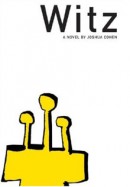 Cohen’s third novel is getting attention for its length (800 pages), its inventiveness with language (downright Joycean, some say), and its conceit (near the turn of the millennium, a mysterious plague wipes out all the world’s Jews but for one, Benjamin Israelien). In the Forward, Dan Friedman writes, “Comparisons to James Joyce are kind to Cohen, but the precocity of Cohen’s talent and his profound love of language from highest to lowest register are reminiscent of the Irishman.”
Cohen’s third novel is getting attention for its length (800 pages), its inventiveness with language (downright Joycean, some say), and its conceit (near the turn of the millennium, a mysterious plague wipes out all the world’s Jews but for one, Benjamin Israelien). In the Forward, Dan Friedman writes, “Comparisons to James Joyce are kind to Cohen, but the precocity of Cohen’s talent and his profound love of language from highest to lowest register are reminiscent of the Irishman.”
Stephen Burn says that “manic invention is the key to this restless novel. . . . Without Jews, Judaism becomes hugely popular. But as everyone converts, Ben tries to escape his fame and is excommunicated. While he wanders in exile, a reverse Holocaust is created: heretics who refuse to accept Judaism are put to death in the camps at Whateverwitz.” Burn concludes that “[s]ome will be exhausted by the tentacular punning paragraphs, but Witz is a brave and artful attempt to explore and explode the limits of the sentence.”
Another warning of fatigue comes from Drew Toal, who writes, “Some will find this exhausting.” But Toal evidently isn’t one of them: “These are gun-shy, play-it-safe times for book publishers, and this epic new novel—biblical in scope and content—doesn’t appear suited for casual page-flipping on the beach. But serious readers should be thankful that Dalkey Archive decided to give it a shot, because just beyond the book’s brainy content and intricate structure is a story that’s entertaining, adventurous, and delightfully absurd.”
Jonathan Liu is charmed, but also, yes, exhausted: “It’s the cross-country cinematics of [Benjamin’s] escape—and, of course, the doorstop heft—that suggests Witz as this decade’s Infinite Jest or White Noise, the young man’s big picaresque of ideas. In truth, it’s much too insular, too slapdash, too particularist for the comparison. Cohen’s is a novel of one idea, and as such, could be comfortably shorter by 400 pages or more, though I wouldn’t want to be the one making the cuts.”
In an interview with his publisher, Cohen explained the book’s title:
It means, in Yiddish as in German, ‘a joke.’ But it also means, in assorted Slavic languages, ‘son of’: Abramowitz being ‘son-of-Abram.’ Variants include ‘vich,’ and ‘vitch’: Rabinovich, Rabinovitch. So, the book is both a joke—the entire book is the entire joke—and a son. Benjamin Israelien, my Last Jew, that son of a witz.
Witz by Joshua Cohen
Dalkey Archive Press, 800 pp., $18.95

